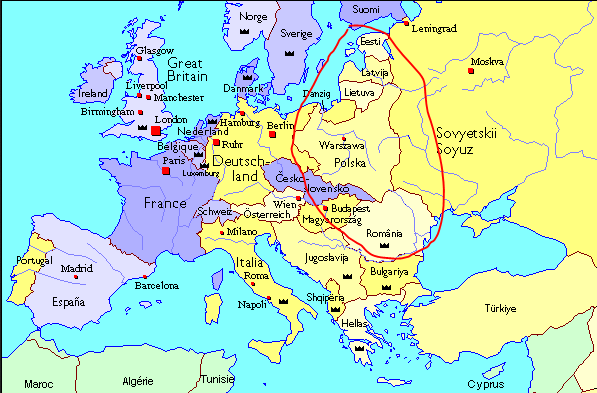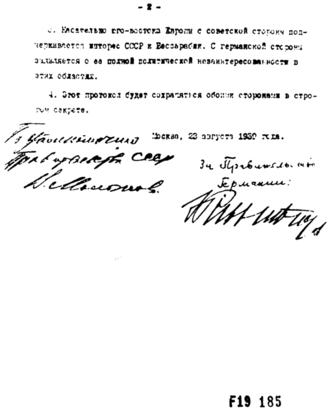This past weekend commemorated the 80th anniversary of the Molotov-Ribbentrop pact between Nazi Germany and Stalinist Russia.
Why did it matter?
[THREAD]
Why did it matter?
[THREAD]

The pact had two parts:
1) a non-aggression provision. As we now know, that didn't last very long (e.g. Operation Barbarossa in 1941).
1) a non-aggression provision. As we now know, that didn't last very long (e.g. Operation Barbarossa in 1941).

Following the signing of this pact, the way was clear for the invasion of Poland on September 1, 1939 

But here's the thing...it didn't have to be this way.
Following Hitler's invasion and dismemberment of Czechoslovakia earlier in 1939, the other European powers knew that Hitler couldn't be trusted 

Throughout the summer of 1939, the British, French, and Soviets planned negotiations to form a pact to deter Hitler.
The August negotiations in Moscow were opened by Soviet Defense Minister Kliment Voroshilov
The August negotiations in Moscow were opened by Soviet Defense Minister Kliment Voroshilov

He opened the meeting with a blunt statement of their objective:
"Our aim is clear-cut: to defend the peace-loving countries headed by Britain, France, and the Soviet Union against the aggressive bloc in Europe. That, I think, is the aim...
"Our aim is clear-cut: to defend the peace-loving countries headed by Britain, France, and the Soviet Union against the aggressive bloc in Europe. That, I think, is the aim...
"...and we must now discuss the means of achieving it...The aggressive European bloc, if it attacks one of the countries, must be smashed at all costs, and for this we must have an appropriate military plan."
So why didn't the sides reach an agreement on a plan to deter Hitler?
The major dispute erupted over the ideal approach for Russia: offensive or defensive? In other words, should Russia take the fight to Germany or sit back and wait?
The major dispute erupted over the ideal approach for Russia: offensive or defensive? In other words, should Russia take the fight to Germany or sit back and wait?
Complicating the matter was the lack of common border
between the Soviet Union and Germany: Poland and Romania separated the two powers.
between the Soviet Union and Germany: Poland and Romania separated the two powers.

Russia wanted Britain and France to pressure their ally, Poland, to grant Russia "pass-through rights"
Needless to say, Poland wasn't too keen on that idea. They had been partitioned by Russia before & had fought a war with Russia in 1920 (below is a Polish propaganda poster).
Needless to say, Poland wasn't too keen on that idea. They had been partitioned by Russia before & had fought a war with Russia in 1920 (below is a Polish propaganda poster).

When coupled with perceived "dithering" by the British and French (mostly because they were "slow walking" making a tough decision), the Soviet's lost patience.
Indeed, Voroshilov chastised the British and French for wasting his time:
Indeed, Voroshilov chastised the British and French for wasting his time:

The negotiations ended without an agreement on August 21. The Molotov-Ribbentrop pact was signed on August 23.
Since that time, historians have debated the sequence of events. Namely, were the Soviets sincere when negotiating with the British and French?
For a sense of the debate, see this @HDiplo review (and the comments by Geoffrey Roberts)
networks.h-net.org/node/28443/dis…
For a sense of the debate, see this @HDiplo review (and the comments by Geoffrey Roberts)
networks.h-net.org/node/28443/dis…
Regardless of who was at fault, the failure of these negotiations gave Hitler a "clear path" to pursue his objectives in Europe. Quite frankly, he now viewed all sides as feckless.
And the broader humanitarian consequences of the pact (and even before the pact) were profound, as @TimothyDSnyder illustrated so vividly in his "Bloodlands"
books.google.com/books?id=maEfA…
books.google.com/books?id=maEfA…
The profound consequences of French, British, and Soviets failing to reach agreement is why this case motivated the writing of my forthcoming @CornellPress book, "Arguing About Alliances"
cornellpress.cornell.edu/book/978150174…
cornellpress.cornell.edu/book/978150174…
So the Molotov-Ribbentrop pact mattered.
But what mattered more was the inability of other major powers to "do something" when it was clear that something had to be done.
[END]
But what mattered more was the inability of other major powers to "do something" when it was clear that something had to be done.
[END]
• • •
Missing some Tweet in this thread? You can try to
force a refresh














